Eating a bowl of yogurt at night is good for weight loss. Low-fat yogurt has a few calories, while it’s packed with nutrients involved in energy metabolism and burn belly fat.
According to many studies, yogurt consumption as part of a healthy, low-calorie, well-balanced diet supports weight loss, reduces waist circumference, and lowers body mass index.[1,2]
Yogurt supports weight loss because it has a few calories
Above all, eating yogurt for dinner is good for weight loss because it has only a few calories. Greek nonfat yogurt has 60 calories per 100g. A serving has only 95 calories![3]
But, only low-fat yogurt is low in calories. Full-fat yogurt has up to 56% more calories! Whole-milk yogurt has almost 150 calories per serving. Without any topping!
It’s necessary to consume a wide variety of filling foods with a few calories while dieting, like 2% unsweetened Greek yogurt.
It’s high in protein
Moreover, low-fat Greek yogurt supports weight loss because it’s one of the richest common foods in protein. It has up to 10.3 grams of protein per 100g. A cup has approximately 16 grams of protein.
Diets high in protein are ideal for weight loss.
Firstly, protein along with fiber has the highest satiety effect. It can keep you full for hours.
Additionally, protein has the highest thermic effect. 20-30% of protein is burned during digestion!
Last, but not least, high protein intake helps preserve body muscle mass while dieting. This is key for maintaining a lean body.
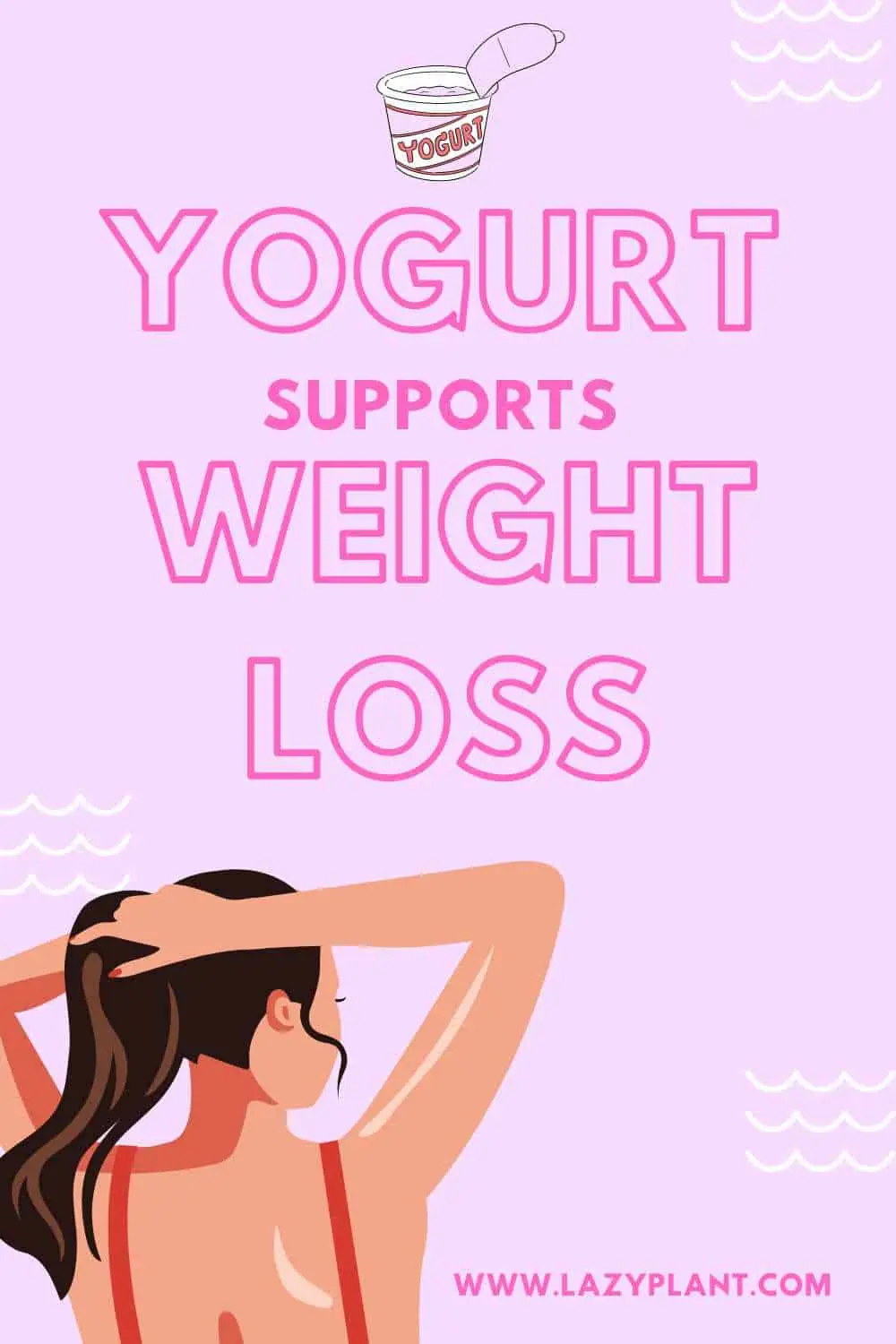
In fact, it’s important to consume a protein-rich meal before bed. Especially if you work out. Protein stimulates overnight muscle synthesis!
Also, protein in yogurt is highly bio-absorbable and has a great amino acid profile. It’s pretty rich in tryptophan; an amino acid that is important for a good night’s sleep! That’s only a reason why yogurt at dinner may improve sleep quality, duration, and onset latency.
High quality sleep is essential for weight loss and improved body composition! The body builds muscle mass at night, while burning belly fat.
Calcium
However, yogurt is much more than a protein-rich snack. It supports weight loss because it contributes to nutrient requirements. Yogurt is packed with nutrients that involved in energy metabolism. It’s beneficial to consume these nutrients before bed.[4]
Above all, it’s well known that yogurt is an excellent dietary source of calcium. In fact, just a cup of Greek yogurt provides about 17% of the Daily Value of calcium.
Getting adequate amounts of calcium is important for maintaining a healthy body weight. Calcium is necessary for burning belly fat.
It has potent anti-obesity properties. Calcium is involved in fat metabolism, thermogenesis, maintaining healthy gut microbiota, and preventing the development of new fat tissue![5]
Vitamin B12
Additionally, yogurt is a great dietary source of vitamin B12. A cup of yogurt provides approximately 45% of the Daily Value. Also, vitamin B12 in yogurt is highly bioavailable.
However, vitamin B12 deficiency is pretty common. There aren’t many foods high in vitamin B12. Most people who follow the standard Western diet get vitamin B12 from eggs, poultry, red meat, and fish.
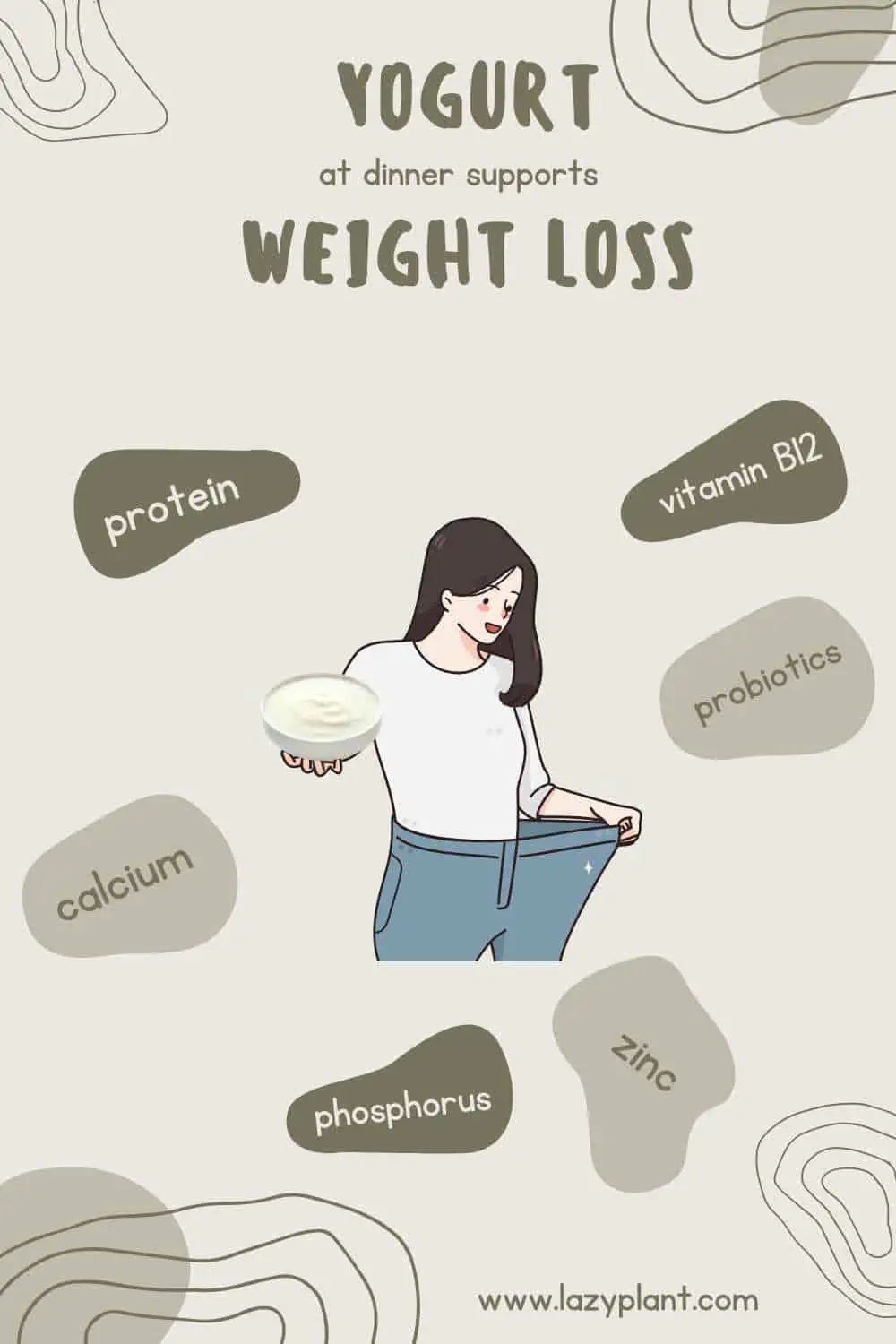
Obese people are more likely to be deficient in vitamin B12. Vitamin B12 deficiency has been linked to a high body mass index (BMI).
As vitamin B12 is important for maintaining a lean body as well as good health, taking supplements with vitamin B12 could be beneficial for many people. A weekly dosage of 1,000 mcg is more than enough for most people.
You can find vitamin B12 supplements at unbeatable prices on iHerb. It’s a global leader in dietary supplements and natural products.
Probiotics
Probiotics are live beneficial bacteria which are naturally found in many fermented foods like yogurt.
Eating yogurts with probiotics may have beneficial effects on weight loss. Probiotics help reduce body mass index and reduce hip circumference. They appear to improve fat metabolism, support digestion, and fight low-grade inflammation.[6]
Also, probiotics may strengthen the immune system. Healthy people are more active, burning more calories during the day. Regular moderate exercise is crucial for weight loss as well. Being active is key for maintaining a healthy body weight.
Phosphorus
Furthermore, yogurt is particularly high in phosphorus. A serving provides 30% of the Daily Value!
Getting high phosphorus intakes is vital for weight loss and decreased waist circumference because it controls appetite. It promotes satiety after a meal. Moreover, phosphorus seems to increase resting metabolic rate![7]
There is no need to take supplements with phosphorus, though. There are plenty of foods with phosphorus.
Zinc
Also, yogurt contains decent amounts of zinc. A cup provides 8% of the Daily Value.
Getting adequate amounts of zinc as long as you follow a low-calorie diet helps you lose even more body weight. Zinc manages appetite, improves insulin resistance, and fights inflammation.[8]
Selenium
Additionally, yogurt is high in selenium. A serving provides about 28% of the Daily Value.
Adequate levels of selenium have protective effects against obesity.[9]
People with normal selenium levels tend to have lower percentage of body fat as well as lower waist circumference.
Obese people have an increased risk of selenium deficiency.

How to eat yogurt at dinner for weight loss?
You could combine yogurt with certain foods to lose more body weight. It’s important to eat certain foods that contain compounds that yogurt lacks of.
Moreover, you should prepare a yogurt snack for dinner that supports sleep. A good night’s sleep is crucial for weight loss.
Melatonin
Firstly, we should eat yogurt with foods naturally high in melatonin. Melatonin is the most important hormone for sleep.
Also, melatonin helps burn belly fat overnight.
A few common foods high in melatonin that taste great with yogurt are strawberries, cranberries, banana, apples, cherries, almonds, and oatmeal.
Oats are among the most nutritious foods you can eat. Combining overnight oats with yogurt is particularly beneficial for weight loss.
Vitamin C
Moreover, it’s beneficial for you to eat yogurt at dinner with foods high in vitamin C. Adequate amounts of vitamin C are also crucial for weight loss and a small waist.
Actually, most fruits are particularly rich in vitamin C and taste great with yogurt. You could eat a fruit salad or drink a smoothie with yogurt for dinner.
Strawberries, mango, papaya, and berries are only a few fruits containing vitamin C.
Keep in mind that pineapple and orange, which also are particularly rich in vitamin C can increase melatonin concentrations by 200%!
Vitamin E
Additionally, you could add foods high in vitamin E to your favorite late-night yogurt snack. Vitamin E plays a key role in insulin sensitivity, fights inflammation, and improves metabolic profile!
One of the richest foods in vitamin E which can be used in many yogurt recipes is almond.
Magnesium
High magnesium intakes are also necessary for maintaining a normal body weight. Magnesium is involved in glucose metabolism.
Pumpkin seeds, chia seeds, almonds, and banana are four of the richest foods in magnesium, which can also be included in any yogurt recipe.
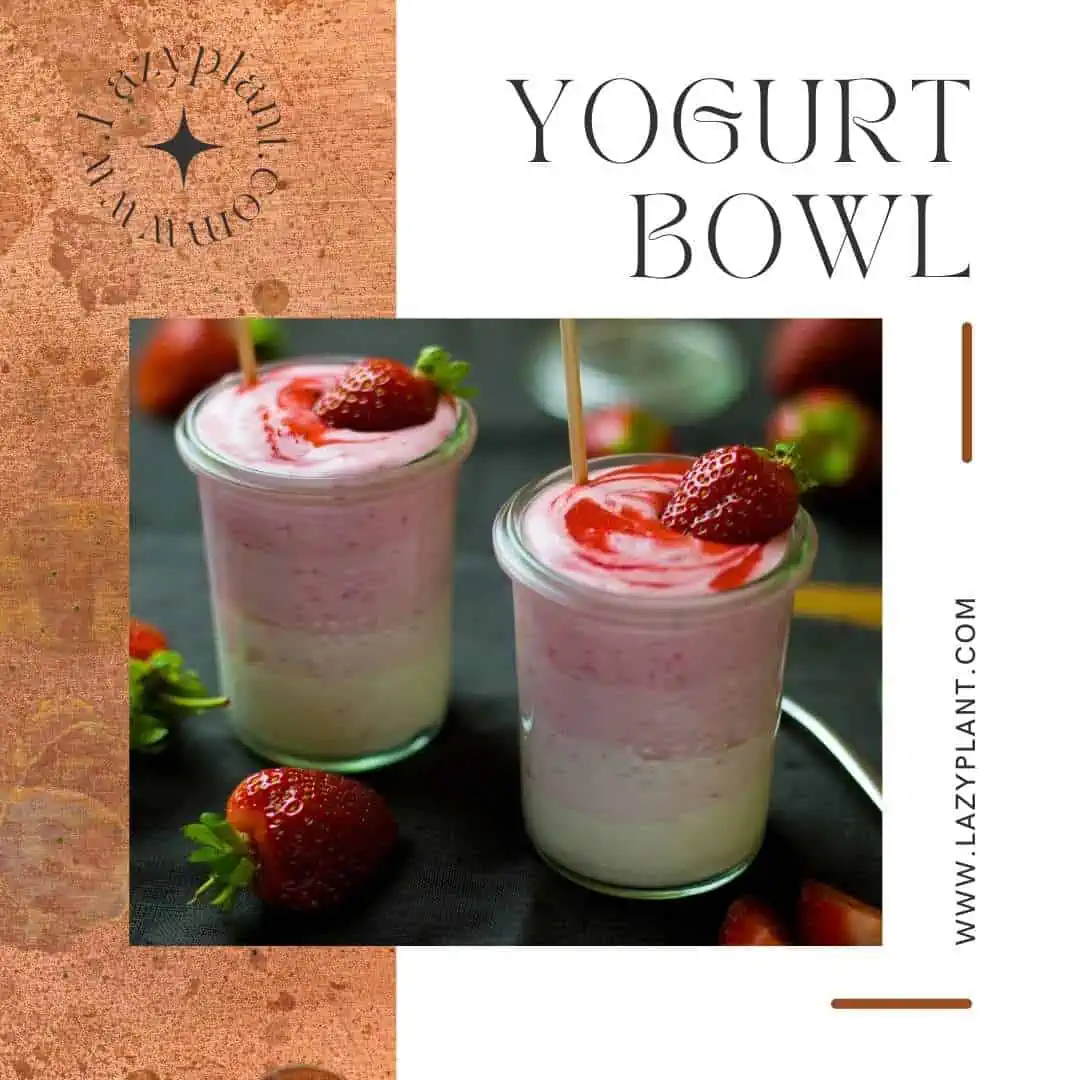
Why is eating yogurt with berries for weight loss a good idea?
Berries are among the best foods you can eat for weight loss and good health.
They’re low in calories and sugar, while they’re high in fiber and powerful antioxidants!
For instance, berries, along with peanut butter, are the richest foods in resveratrol. This potent polyphenol appears to improve body composition. It helps burn belly fat while preserving lean mass.[10]
Hence, you should eat yogurt with raw blueberries, raspberries, strawberries, blackberries, or cranberries for dinner.
Cranberries and strawberries are particularly rich in melatonin as well.
Additionally, you could add 1-2 tablespoon of a high-quality, berry jam to your yogurt instead of honey. Reasonable amounts of a sugar-free berry jam supports weight loss.
But, jam should contain only natural sugars from berries. Too much sugar is bad for weight loss. Especially when consumed before bed.
Eat only whole fruits if you’re on a diet, though. Dried fruits have too many calories and sugar.
Omega-3s
Moreover, it’s good for you to add foods high in omega-3s to your yogurt bowl.
Omega-3s improve body composition, as they help burn belly fat and promote the synthesis of muscle mass overnight.[11]
Avocado, walnuts, and certain seeds are great dietary sources of omega-3s. All are great ingredients to any yogurt recipe.
Fiber
Last, but not least, combining yogurt with fruits, seeds, or nuts supports weight loss because they’re particularly rich in fiber. On the contrary, yogurt doesn’t contain any.
Meals high in fiber and protein have the highest satiety score! They can keep you full for hours!
Additionally, you could drink a glass of water before consuming dinner. Water can further promote the feeling of fullness. Moreover, proper hydration is necessary for burning fat.
15 easy recipe ideas with yogurt for dinner
You could combine yogurt with fruits, berries, seeds, and nuts to prepare the best dinner for weight loss.
Almonds, walnuts, Brazil nuts, peanut butter, avocado, banana, strawberries, cranberries, blueberries, raspberries, chia seeds, flax seeds, and hemp seeds are only a few of the foods you could add to yogurt in order to prepare the ultimate dinner for weight loss.
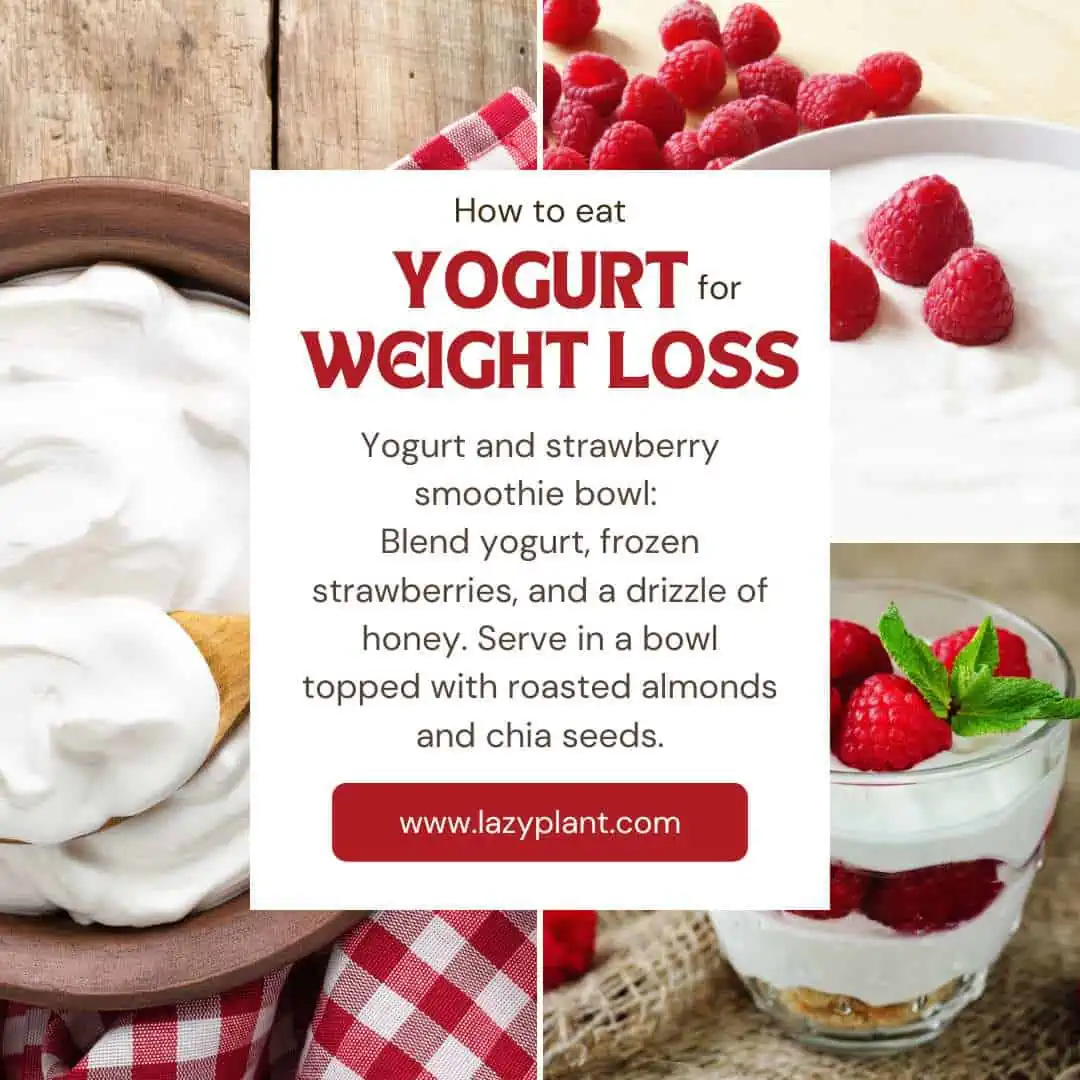
Also, you could sprinkle cinnamon on your yogurt. Cinnamon controls postprandial glucose responses.
Here are 15 easy recipe ideas with yogurt for dinner:
- Peanut butter and banana yogurt smoothie: Blend yogurt, peanut butter, banana, and flax seeds for a quick dinner.
- Yogurt and strawberry smoothie bowl: Blend yogurt, frozen strawberries, and a drizzle of honey. Serve in a bowl topped with roasted almonds and chia seeds.
- Raspberry and chia seed yogurt bowl: Mix yogurt with mashed raspberries and chia seeds. Serve with sliced banana and a sprinkle of hemp seeds.
- Yogurt and avocado salad: Toss mixed greens with sliced avocado and a yogurt-based dressing. Top with chopped walnuts.
- Blueberry and flax seed yogurt parfait: Layer yogurt, blueberries, and flax seeds in a glass. Top with sliced bananas and chopped Brazil nuts.
- Banana and almond yogurt smoothie: Blend yogurt, sliced banana, and a tablespoon of berry jam. Top with chopped roasted almonds.
- Yogurt and hemp seed granola bowl: Top yogurt with hemp seed granola, sliced strawberries, and a drizzle of honey.
- Raspberry and almond yogurt bowl: Mix yogurt with mashed raspberries and sliced almonds. Serve with a side of sliced avocado.
- Peanut butter and blueberry yogurt smoothie: Blend yogurt, peanut butter, frozen unsweetened blueberries, and flax seeds for a quick and easy dinner.
- Yogurt and chia seed parfait: Layer yogurt and chia seeds in a glass. Top with sliced bananas and chopped walnuts.
- Yogurt and cranberry smoothie bowl: Blend yogurt, frozen cranberries, and a drizzle of honey. Serve in a bowl topped with roasted almonds and chia seeds.
- Blueberry and hemp seed yogurt bowl: Mix yogurt with mashed blueberries and hemp seeds. Serve with sliced bananas and chopped Brazil nuts.
- Yogurt and raspberry smoothie: Blend yogurt, frozen raspberries, and a drizzle of honey.
- Cranberry and almond yogurt parfait: Layer yogurt, cranberries, and chopped almonds in a glass. Top with sliced bananas.
- Yogurt and banana smoothie bowl: Blend yogurt, sliced banana, and a tablespoon of berry jam. Serve in a bowl topped with chopped walnuts and flax seeds.
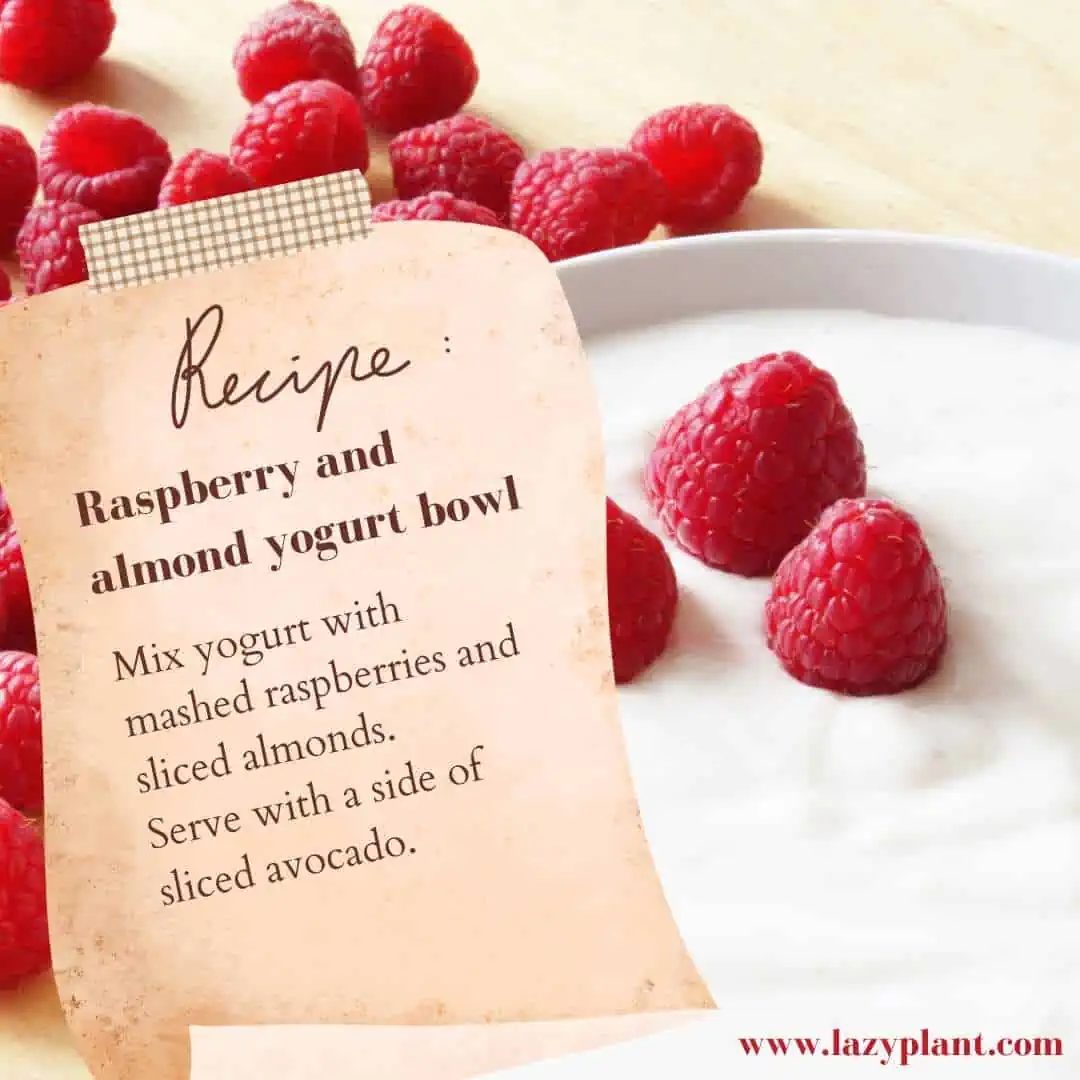
How long before bed should I eat a bowl of yogurt for a lean body?
Meal timing plays a key role in weight loss. Especially dinner timing. We should have dinner at least a couple of hours before going to bed. Having dinner right before bed has been associated with increased risk of obesity. Therefore, you should eat yogurt for dinner at least two hours before bedtime.
Can yogurt before bed make you fat?
Yes, eating yogurt at night can make you fat. You should be very cautious with dinner timing as well as total calories of a yogurt bowl.
Too many calories from toppings
You shouldn’t add many ingredients to yogurt. They can skyrocket the total calorie content of your meal.
Seeds, nuts, and dried fruits have too many calories. For instance, raisins have 300 calories while almonds have 579 calories per 100g!
Hence, as a rule of thumb, try to add no more than half a handful of mixed seeds and nuts to your yogurt. This amount contains less than 100 calories.
Moreover, just a tablespoon of honey or jam contains about 65 calories.
Hence, it’s easy to consume too many extra calories from toppings.
Moreover, too many ingredients are bad for digestion. Keep in simple. Add no more than 2 ingredients to your favorite yogurt snack.
Full-fat yogurt
Additionally, full-fat yogurt, flavored yogurt, or yogurt desserts have too many calories, due to added sugar.
In fact, full-fat yogurt, as all animal-derived foods, is high in saturated fat. Just a cup of full-fat yogurt contains 30% of the maximum safe daily intake!
According to the American Heart Association, we shouldn’t consume more than 13 grams of saturated fat per day. Too much saturated fat may raise LDL cholesterol and increase the rick of heart disease.[11]
Moreover, diets high in saturated fat have been associated with increased risk of body mass index.[12]
Should all people eat yogurt at dinner for weight loss?
Actually, in some cases, people should avoid consuming yogurt if they want to lose weight.
Lactose intolerant people
People with lactose intolerance should avoid consuming cow’s yogurt. It may cause abdominal discomfort or diarrhea. Lactose free or vegan yogurts are great alternatives, though.
Individuals with digestion issues
People with digestion issues like gastroesophageal reflux disease may have to avoid consuming yogurt before bed as well. Full-fat yogurt, in particular, may deteriorate symptoms.
Certain patients better avoid consuming yogurt
Also, people who suffer from allergic diseases, asthma, the flu, or the common cold may be better to refrain from eating yogurt or any other dairy product.
These products may deteriorate their health. Yogurt may negatively affect breathing, cause coughing, or other adverse effects.
Always consult your physician before changing your diet.
Cow’s milk or vegan yogurt for weight loss?
Both cow’s milk and vegan yogurt can be part of a healthy diet for weight loss.
However, you should pay attention to the calorie and sugar content of the yogurt you choose. Both types of yogurt can be packed with added sugar and calories. Full-fat cow’s milk yogurt has many fats as well.
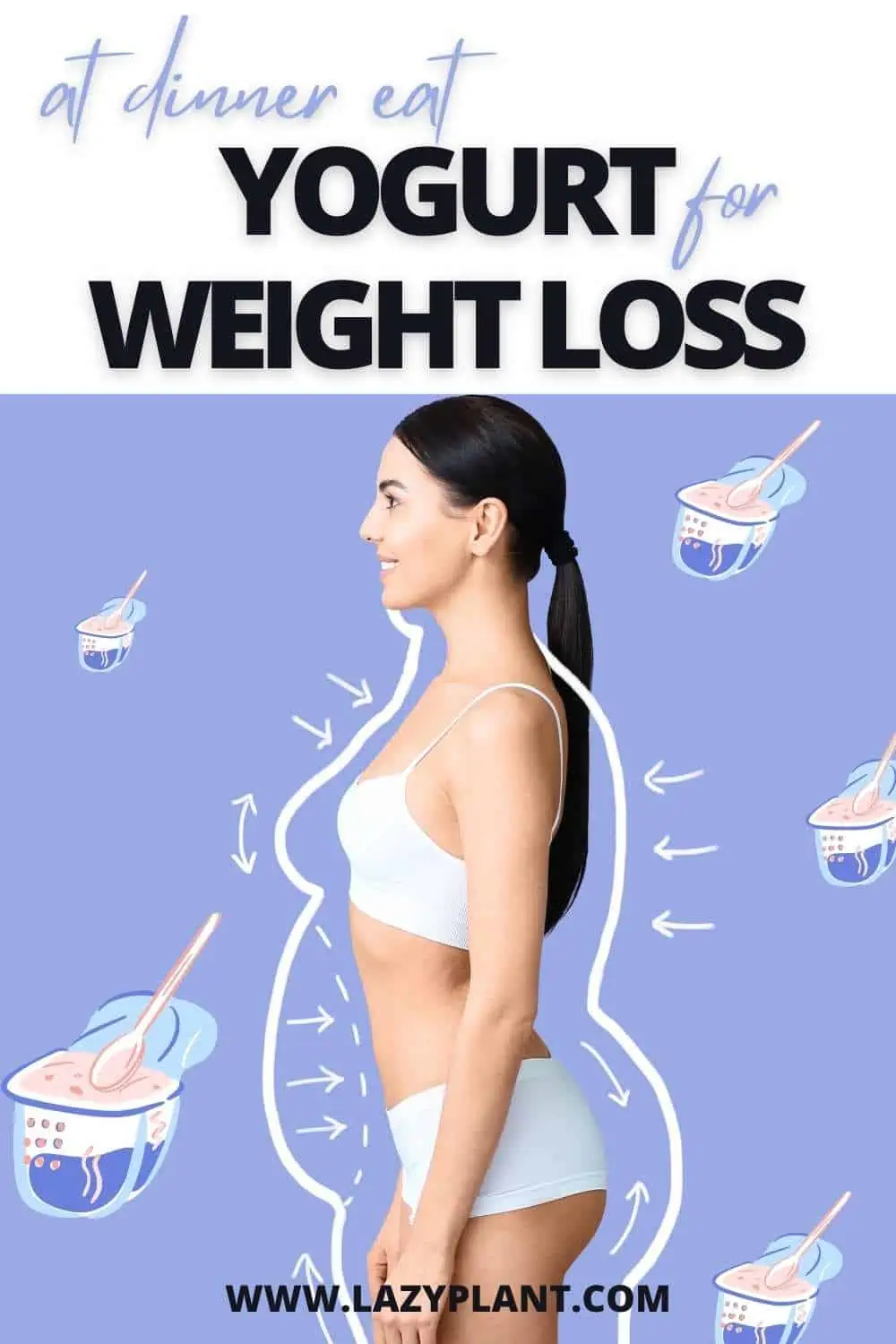
On the other hand, vegan yogurts usually have fewer nutrients than traditional Greek yogurt. Only fortified vegan yogurts may provide the same amount of protein and calcium as cow’s milk yogurt.
Certainly, vegan yogurts support a lean body as part of a well-balanced diet.
What’s the best time of the day to eat yogurt for weight loss?
Actually, we can consume yogurt at any time of the day. You can enjoy it at breakfast, at dinner, after exercise, or as a filling snack between meals.
Yogurt, milk, or other dairy products before bed for weight loss?
Actually, the best dairy product to eat before bed for weight loss is Greek low-fat yogurt. It’s particularly rich in tryptophan, calcium, phosphorus, and vitamin B12. Many yogurts are good dietary sources of probiotics as well.
Other dairy products contain substantially less beneficial nutrients for weight loss. On the contrary, they’re packed with saturated fats, which can cause weight gain when consumed in high amounts. You should consume whole milk, cheese, and butter only in moderation.
Only cottage cheese at dinner supports weight loss. It promotes satiety with only a few calories.
Other favorite snacks for weight loss to have for dinner!
Actually, there are lots of great easy snacks you can eat at dinner for a lean body.
For instance, turkey, chicken, and tuna sandwiches when consumed as part of a well-balanced, hypocaloric diet promote weight loss.
Also, you could eat a cup of fruit salad for dinner. You could add 1–2 tablespoons of yogurt as well.
Even a peanut butter and jelly sandwich as well as cheese with crackers at night are beneficial for weight loss.
Foods to avoid eating at night if you want a lean body
You should be very cautious with eating habits at night. We tend to overeat before bed.
Above all, you should avoid consuming fattening foods, such as fast food, fried or packaged foods, sweets, sodas, pasta etc.
Your dinner should be light if you want to maintain a lean body. Prefer eating foods high in protein and fiber. Avoid sugar and fat before bed.